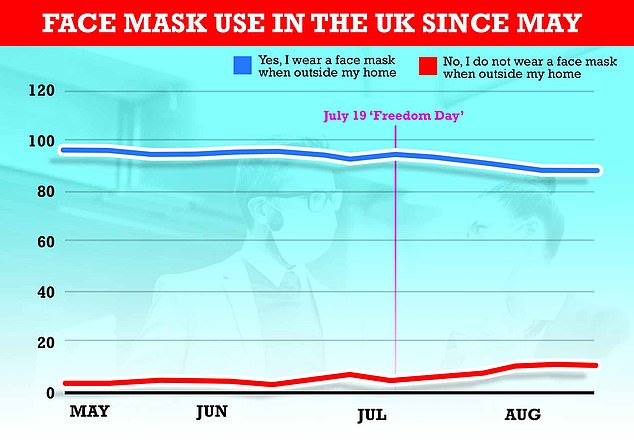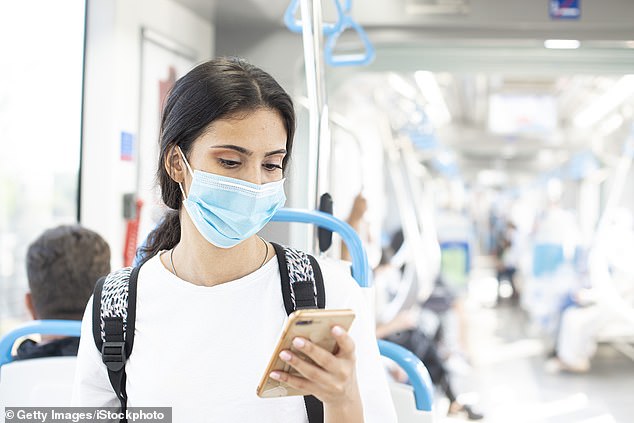Millions of Britons stopped wearing face masks in public this summer, Government data suggests.
An Office for National Statistics survey found 89 per cent of people wore coverings outside their home in the week ending September 5. For comparison, uptake stood in the region of 98 per cent at the start of May when the second wave was receding.
This equates to around 4.3million people having turned their backs on masks, figures suggest.
Face masks help stop the spread of the coronavirus by catching miniscule droplets exhaled by infected people. But the science on how well they work has been patchy, although experts insist the benefits of wearing coverings are obvious.
Boris Johnson scrapped rules which enforced mask-wearing indoors in England on ‘Freedom Day’ July 19, despite No10’s top scientists calling for people to keep using them.
But unveiling his winter plan this week, the Prime Minister warned they could still be brought back if the virus again spirals out of control.

Some 89 per cent of Britons said they wore face masks outside the home at the end of August. For comparison, in May it was 98 per cent

Fewer Britons are wearing face masks outside the home than at the start of May, official figures suggest (stock)
Face masks don’t need to be worn in the Commons because MPs are not ‘strangers’, says Sajid Javid
Sajid Javid today said Tory MPs do not need to wear face masks in the packed House of Commons because they are not ‘strangers’.
The Health Secretary also defended Cabinet ministers for failing to wear face coverings at a meeting yesterday morning.
He said the meeting, which saw ministers sit shoulder to shoulder around the traditional Cabinet table, was ‘perfectly consistent’ with the Government’s guidance on masks.
Mr Javid said people ‘should consider wearing masks in crowded places when they are with strangers, when they are with people that they are not normally spending time with’.
Opposition MPs have accused Tory MPs of being ‘cavalier’ with the health of other parliamentarians after many stopped wearing masks in the Commons.
Advertisement
The ONS coronavirus and social impacts survey highlighted the drop in face mask use across the country.
The survey, of around 3,400 adults, asked people if they had used a face covering when outside their home in the past seven days.
England does not require them to be used at present but they are still required on Transport for London.
Scotland still has rules saying masks must be worn in shops, on public transport and in restaurants and pubs when seated.
In Wales, the coverings are still mandatory on public transport and in public areas indoors.
And in Northern Ireland they must still be worn in shops and hospitality venues.
Throughout the pandemic there has been fierce scientific debate about how well they guard against transmission, despite nearly every country in the world mandating or encouraging their use.
Lab tests and observational studies have shown masks can block infected people from exhaling up to 80 per cent of the virus into the air and also protect wearers from inhaling up to 50 per cent of the particles.
But real-world studies, which involve more scientific rigour, have produced mixed results.
Experts previously told MailOnline that vaccines were doing such a good job there was little reason to wear face masks.
But they said the coverings could still be beneficial in hospitals, care homes and crowded places with poor ventilation such as the tube.
They said high grade FFP3 masks would be the best option, over homemade cloth masks.
It comes as Health Secretary Sajid Javid yesterday said that Mr Johnson and his cabinet did not need to wear masks in close spaces because they were not ‘strangers’.
Asked about a photo of a cabinet meeting where no one was wearing face masks, Mr Javid insisted to Sky News yesterday: ‘That is perfectly consistent with what the PM said yesterday and what I said yesterday.
‘Because what we said is that people should consider wearing masks in crowded places when they are with strangers, when they are with people they are not normally spending time with.’
Government guidance reads: ‘We expect and recommend that members of the public continue to wear face coverings in crowded and enclosed spaces where you come into contact with people you don’t normally meet.’
Source link : https://www.dailymail.co.uk/news/article-9996899/More-four-million-people-stopped-wearing-face-masks-public-summer.html











